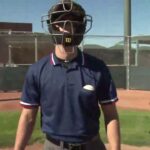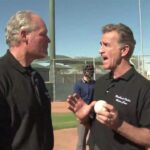NCAA 6-5 Dead Ball—Play Suspended
Dead Ball—Play Suspended
SECTION 5. Time shall be called by the umpire and play is suspended when:
a. Weather, ground conditions or light conditions are judged unfit for play;
b. A player or spectator is ejected from the playing field;
c. An unusual circumstance interferes with the normal progress of the game, such as any crowd action, animal, ball, or other object on the field (see 6-4-a PENALTY);
d. An umpire or player is injured, except that if injury occurs during a live ball, time shall not be called until no further advance or putout is possible; If a player is injured and cannot proceed to the awarded base(s), a substitute runner may be used to complete the play.
e. A player or coach requests time for a substitution, a charged offensive or defensive conference, for equipment changes, or for similar cause.
f. A coach or player is granted a timeout for an offensive or defensive conference. Each team shall be allowed three (3) offensive and (6) defensive conferences per game, no more than three (3) of which may include a coach. If the game goes into extra innings, the team will receive one (1) extra defensive conference and one (1) extra offensive conference plus any unused conferences from the first nine innings.
Note: Offensive conferences may be used consecutively in the same inning.
1) Umpires shall record offensive and defensive conferences and notify the coach when each conference is charged.
2) After the maximum number of offensive and defensive conferences have been used, the umpire shall warn the coach before penalizing the offending team.
PENALTY for (2)—The player involved in the conference shall be removed from the game. If the conference is between the head coach and the assistant coach, the assistant shall be removed from the game.
3) Offensive and defensive conferences not previously used may be used in extra innings.
4) Offensive conferences shall not be charged during a defensive team’s timeout for a pitching change. Any runners who leave their positions during the pitching change must return to their bases prior to the last warm-up pitch so play is not delayed or risk being charged with an offensive conference. Batters or runners may not leave their positions during a charged defensive conference unless they also request an offensive charged conference.
g. The umpire wishes to examine the ball; or
h. The plate umpire holds up a hand instructing the pitcher not to pitch until the batter or umpire is ready. The ball is dead and no other play shall be allowed until the umpire declares, “Play” or uses some other appropriate signal such as a point toward the pitcher to indicate “Play” and that the ball is live. When a batter is getting set, the umpire shall keep one hand up to the pitcher to indicate that the ball is dead.




